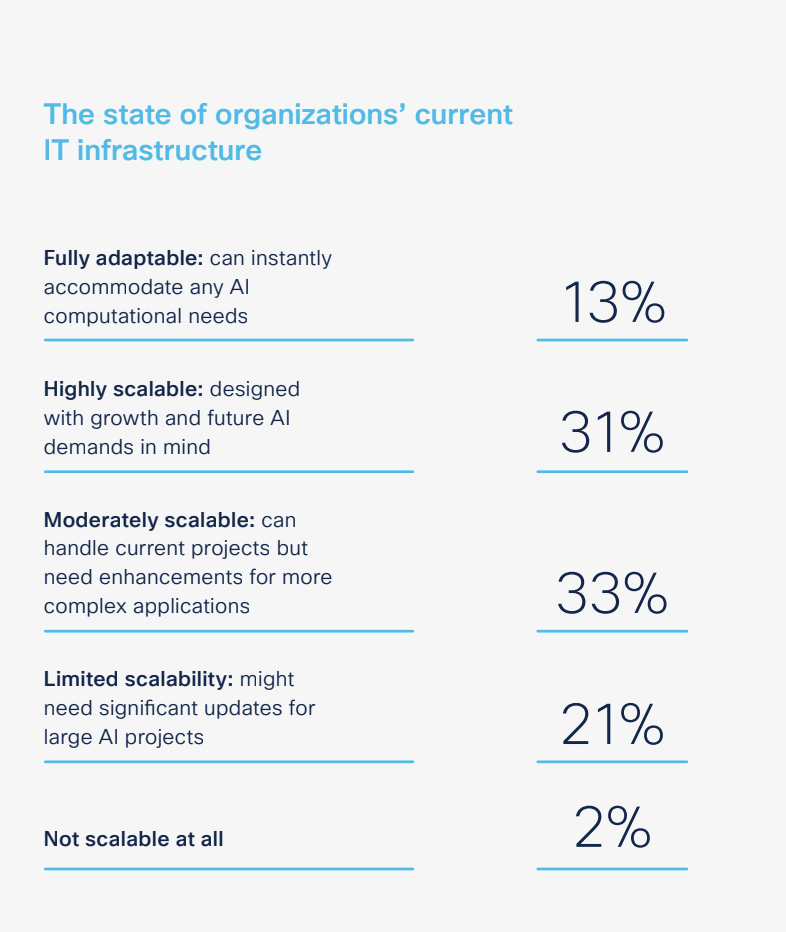A new report from Cisco found that a mere 14% of companies are ‘fully prepared’ for the arrival of AI
In a newly released report which surveyed over 8,000 global companies, Cisco benchmarked readiness for artificial intelligence (AI) adoption and integration, finding that a mere 14% of companies are “fully prepared” for AI’s arrival. According to Cisco, gaps across six key business pillars — strategy, infrastructure, data, governance, talent and culture — are to blame for the lack of preparedness around AI, despite 97% of organizations acknowledging that urgency to deploy AI-powered technologies has increased over the past six months.
More specifically, 61% of respondents feel that they only have one year before their companies can expect to see negative business impacts of not having a sufficient AI strategy. As such, while a vast majority of companies to feel “fully prepared” for AI, 95% of reported that already have a “highly defined AI strategy” in place or are in the process of developing one. Cisco said this detail is “a positive sign,” but suggests that there is still “more work to do.”
As mentioned previously, one of the biggest obstacles facing organizations as they attempt to keep pace with AI innovation is their current infrastructure: 95% of businesses are aware that AI will increase infrastructure workloads, but only 17% or organizations have networks that are fully flexible and can handle this level of complexity. “In the current competitive environment, the ability to leverage AI quickly provides a distinct advantage. Scalability and flexibility of an organization’s existing IT infrastructure are crucial to seizing this advantage as scalable architecture can grow to handle increasing demands, while flexible architecture can adapt easily to changes without major disruptions,” Cisco stated in its report.

However, 23% of companies said they have “limited or no scalability at all” when it comes to meeting new AI challenges within their current IT infrastructures, while 30% say the latency and throughput of their network is not optimal or sub-optimal and 48% agree that they need further improvements.
The majority of respondents (54%) indicate that their infrastructure has only “moderate or limited scalability,” requiring enhancements or updates to handle complex AI applications. Less than a third (31%) said their infrastructure is “highly scalable” and 13% consider their infrastructure “fully adaptable” and capable of “instantly” accommodating the computational needs of AI.
The AI-readiness of data is also proving challenging for organizations, so much so that Cisco found it to be the pillar with the lowest readiness score, with 81% of all respondents claiming some degree of siloed or fragmented data in their organization. “This is a key issue as the complexity of integrating data that resides in various sources and making it available for AI implications can impact the ability to leverage the full potential of these applications,” said Cisco.
“The race to AI Readiness is on, with organizations under intense pressure to shift from strategic planning to execution mode in order to capitalize on the transformative potential that AI represents,” commented Liz Centoni, Cisco’s executive VP and GM of applications and chief strategy officer. “To realize the benefit of AI-powered products and services, companies need solutions that secure and observe their AI models and toolchains to ensure performance, secure sensitive data and systems, and deliver trustworthy and responsible AI outcomes.”

